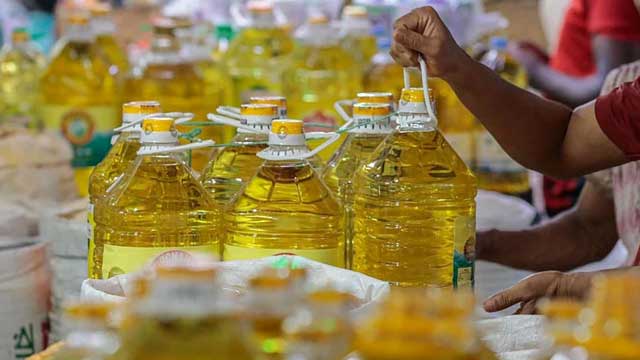The supply situation of soya bean oil did not improve on the city market on Friday although the government on Thursday allowed traders to increase the price of the commodity by nearly 30 per cent.
Together with the pricy edible oils, consumers have been filling the pinch of high prices of almost all commodities after Eid-ul-Fitr.
Traders said that edible oils had been retailing at high prices for the past two weeks as distributors and wholesalers drastically cut their supply.
Amid the supply crunch, the government and vegetable oil refiners on Thursday officially announced the new edible oil prices with an increase of up to Tk 44 a litre but the supply situation did not improve till Friday.
Zakir Hossain, a retailer at Karwan Bazar, said that distributors were yet to start releasing soya bean oil, adding that the satiation might improve on Sunday.
The price of soya bean oil was increased by Tk 38–44 a litre while palm oil saw a Tk 42 rise per litre from Friday.
Retailers said that wholesalers and distributors assured them that they would increase the supply of edible oils from Sunday.
Though the commerce ministry and refiners on Thursday set the price of unpackaged soya bean oil at Tk 180 a litre, the item was selling at Tk 190–200 a litre in different city areas on Friday.
A one-litre bottle of soya bean oil sold for Tk 195–198 while a five-litre container of the item sold for Tk 960–985 in the city on the day.
Palm oil sold for Tk 175 a litre.
Rezaur Rahman, a private job holder living in Mirpur in the city, said that he had visited at least five grocery stores but did not find a five-litre container of soya bean oil.
He said that both the steep rise in the cooking oil prices and the supply crisis were unacceptable.
Earlier, in the first week of March, the price of unpackaged soya bean oil had hit as high as Tk 190 a litre and the government withdrew value-added tax on the item to arrest the price spiral.
Following the withdrawal of VAT on the import of edible oils, the commerce ministry at a meeting with refiners on March 20 had reduced the price of packaged soya bean oil to Tk 160 a litre from Tk 168 a litre.
The price of five-litre packaged soya bean oil was brought down to Tk 760 from Tk 795 while the price of unpackaged soya bean oil was set at Tk 136 a litre in the meeting.
On March 22, the ministry had reduced the price of palm oil to Tk 130 a litre from Tk 133 a litre.
But traders did not comply with the government set prices for a single day.
‘I suspect that the traders who have stockpiled soya bean oil will now start releasing their stock as the jump in the prices has created a scope for them to gain massive profit,’ Consumers Association of Bangladesh president Ghulam Rahman told New Age.
He said that consumers should think of alternatives in order to avert the extra financial pressure due to the abnormal price hike of soya bean oil.
Ghulam Rahman also suggested that the government, too, should go for increasing the domestic production of edible oils.
Besides edible oils, most other commodities remained costly on the city market on Friday.
Beef sold for Tk 680–700 a kg and mutton for Tk 900–1,000. The price of broiler chicken also remained high and it sold for Tk 180–185 a kg.
The Sonalika variety of chickens sold for Tk 280–310 a kg and the local variety for Tk 500–550 on the day.
The price of onions has gone up by Tk 5 a kg over the week.
Both the local and imported varieties of onions sold for Tk 30–40 a kg in the capital on the day. A week ago, the former sold for Tk 25–30 a kg and the latter for Tk 30–35.
The price of red lentil, too, remained high.
The coarse variety of the item sold for Tk 100–105 a kg and the medium-quality variety for Tk 110–115 on Friday.
The fine variety sold for Tk 120–130.
Imported garlic sold for Tk 120–130 a kg while the local variety sold for Tk 60–80 on the day. Rice remained costly over the week and the coarse variety of the staple sold for Tk 45–48 a kg in the city on Friday.
The medium-quality variety of rice sold for Tk 50–52 a kg while the BR-28 variety, also known as a lower-grade Miniket, retailed at Tk 52–55 a kg.
The fine-variety Miniket sold for Tk 65–70 a kg and Najirshail for Tk 68–70 on the day.
The prices of vegetables remained unchanged in the city over the week.
Aubergine sold for Tk 60–80 a kg, papaya for Tk 30–40, bitter gourd for Tk 60–80, bottle gourd for Tk 50–60 apiece, cucumber for Tk 30–40 a kg, carrot for Tk 40–60 and tomatoes for Tk 30–40 on the day.
Green chilies sold for Tk 100–120 a kg on the day.
Fish was also dear.
Rohita sold for Tk 280–400 a kg and Katla for Tk 280–380, depending on size and quality.
Pangas sold for Tk 160–190 and Tilapia for Tk 150–160.
The price of potatoes remained unchanged over the week and the item sold for Tk 18–20 a kg on Friday.
The price of ginger, too, remained unchanged, with the imported variety selling for Tk 120–130 a kg and the local variety for Tk 80–110 on the day.
The price of eggs remained unchanged over the week and the item sold for Tk 35–36 a hali (four pieces).
Fine-quality packaged salt retailed at Tk 32–35 a kg and the coarse variety at Tk 20–25 a kg on the day.





